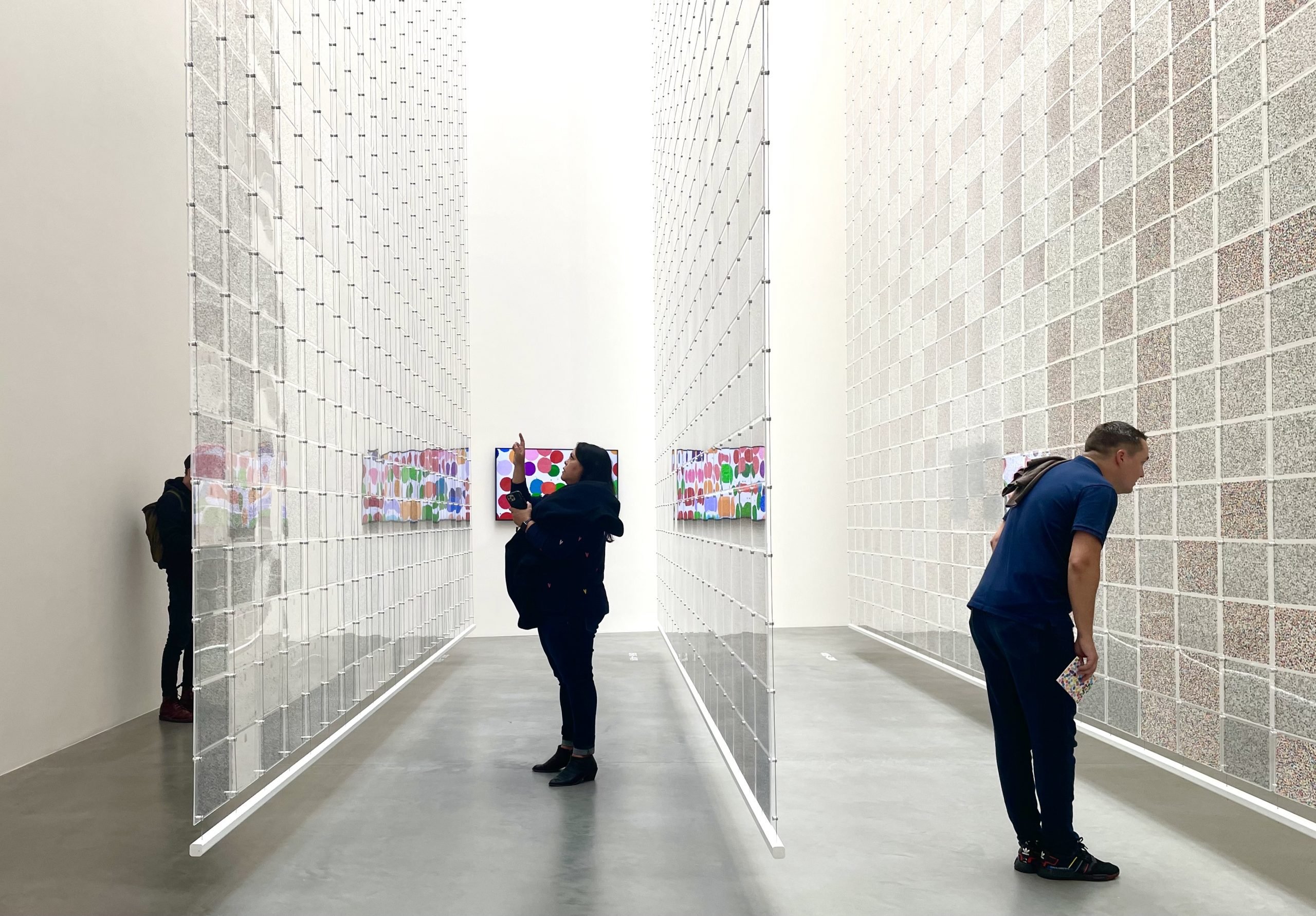
Excitement was in the air on Thursday afternoon at London’s Newport Street Gallery. But the throngs of visitors chatting excitedly or snapping photos of the display were not the usual art crowd, and this certainly was not a usual art opening.
It was a “community event” to preview the exhibition of “The Currency,” Damien Hirst’s first NFT collection in collaboration with HENI, an international art services business, ahead of the official public opening today at the artist’s gallery. Most of the members of this “community” were “currency holders,” meaning they have participated in Hirst’s experimental project.
“The Currency” launched in July 2021 as a collection of 10,000 NFTs, each corresponding to one of 10,000 unique spot paintings by the U.K.’s richest artist. Those who acquired one of the NFTs, originally for $2,000, had the option to keep the digital token or exchange it for the physical artwork.
The exchange period closed on July 27, with 5,149 “currency holders” choosing to trade their NFTs in for the physical paintings. At the gallery, the paintings that had been collected are replaced in the display with translucent, black-and-white slides of the original spot painting.
As for the remaining works on paper, representing the 4,851 works owned by people who chose to keep the NFT, they will be literally burned by the artist himself during the week of Frieze London. They are thus being shown here for the last time before they vanish into the flames.
Installation view, Damien Hirst: ‘The Currency’ (2022), Newport Street Gallery, London. Photographed by Prudence Cuming Associates Ltd. © Damien Hirst and Science Ltd. All rights reserved, DACS 2022.
“The whole project is an artwork, and anyone who buys The Currency will participate in this work, it’s not just about owning it,” Hirst said in a statement. “It is the most exciting project I have ever worked on by far.”
Judging from the show’s preview, he was not exaggerating. A sense of excitement was shared widely by the participants here. Many greeted each other in person as if they were long-lost friends, seeming to represent the spirit of “community” widely touted in NFT culture. They ranged from seasoned art collectors to those who had never set foot in a gallery before.
Henry Elphick, 39, a designer and a seasoned art collector who said he had owned a few Hirst prints in the past, was spotted looking for his “Currency” pieces in the gallery. Elphick was playing both sides of the project: He had exchanged one of his NFTs for a physical spot painting while keeping another NFT.
“Currency holders” turned up for the community event previewing the exhibition of Damien Hirst’s NFT project “The Currency” at Newport Street Gallery, London, on September 22, 2022. Photo: Vivienne Chow.
“I find it fascinating,” Elphick told Artnet News. “I wanted to see where it led. [Hirst] is obviously quite clever about trying to migrate the kind of physical collector into the digital world, whereas everyone else is potentially predominantly doing digital straightaway.”
Stuart Bumford, a 49-year-old paint sprayer, dressed up for the occasion in a colorful spot shirt to match the artworks on show. “The Currency” was the first NFT project he’d participated in, he noted, adding that he and two of his friends had been excited that their applications to buy the NFT and participate were successful. However, eventually he and his friends chose to keep the physical artworks.
“I knew that I didn’t really want one of mine being one of the ones that is going to get burned,” said the camera-shy but cheerful currency holder. The project had yet to convert Bumford into an NFT fan, but he got a lot out of the culture around “The Currency” all the same. He was delighted to have “met a couple of people on Discord. Obviously it’s a great community there.”
Happy shopping: besides artworks and NFTs, Damien Hirst’s “The Currency” also comes with a big collection of merchandise, which proved to be fans’s favorite during the community event on September 22, 2022. Photo: Vivienne Chow.
There was a noticeable absence of women at the community preview, noted Naomi Ford, a therapist in her 40s who was standing in a long line to purchase a “Currency”-themed tote bag (the show comes with a large selection of associated merchandise). Ford was one of just a handful of women holders seen at the gallery. Unlike the men Artnet News spoke to, she chose to keep the NFT, her first.
“I know, crazy,” said Ford, though her eyes were shining with excitement. “I didn’t know the NFT market space as it’s new, and I kind of wanted to be part of that. I know, lots of people are like, ‘oh, I wish it was on my wall.’ But then also, I’m like, there could be something else happening.”
The dearth of women showed that the NFT realm “is a very male-dominated space,” she said, though she added, “maybe it’s quite like the rest of the world.” She also pointed out that the crowd attending the opening was relatively mature. “Look at the age demographic here. We’re not that young. But then that’s the money, isn’t it? Maybe it’s to do with where you put your funds.”
Skeptics might question whether “The Currency” was just another over-hyped show by the media-savvy artist or a cash grab. But to the enthusiastic crowd that has followed this project from day one to seeing the art hung in the gallery, “The Currency” has brought a great deal of joy, which is priceless.